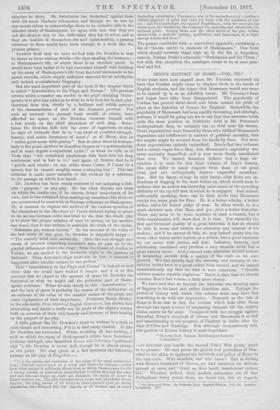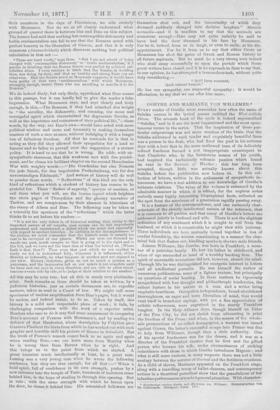IHNE'S HISTORY OF ROME.—VOL. III.* SOME years have now elapsed
since Mr. Freeman expressed his fears that Curtius might come to displace Grote in the hands of English students, and his hopes that Mommsen would not come to be looked up to as an infallible oracle. Mr. Freeman's fears and hopes have alike been disappointed. The popularity of Curtius has proved short-lived, and Grote retains his pride of place as the historian of Greece for England. Meanwhile, the popularity of Mommsen has been rapidly increasing, and although, perhaps, it would be going too far to say that this historian holds quite the same position as Niehbuhr held in Mr. Freeman's undergraduate days, he certainly has no rival near his throne. Great expectations were formed by those who disliked Mommsen's dogmatism and indifference in matters of political morality, that the sceptre might be wrested from his hands by Ihne. Nor were these expectations entirely unjustified. Ihne's first two volumes had a certain vogue for a time, but Mommsen's supremacy was
never seriously imperilled, and is now more firmly established than ever. We cannot therefore believe that a large cir- culation is in store for this third volume of Ihne's history. His views differ in many respects from those of his great rival, and not unfrequently deserve respectful considera- tion. But we fancy—it may be only fancy—that there are in- dications of flagging in the work before us, which would seem to indicate that its author was becoming more aware of the exceeding difficulty of the up-hill task in which he is engaged. And indeed, colloquially speaking, there can be little doubt that Mommsen carries too many guns for Ihne. He is a better scholar, a better writer, and a far better judge of men. In other words, he is a much cleverer man than Ihne, and ipso facto a better htstorian. There may seem to be some injustice in such a remark, but a little consideration will show that it is true. For assuredly the first and foremost quality of a great historian is that he should be able to rouse and sustain the attention and interest of his readers ; and if lie cannot do this, we may indeed praise him for every other virtue under heaven as a writer, but a great historian
we can never, with justice, call him. Industry, honesty, and scholarship combined may produce a very valuable work, but a great history never. And a second-rate historian should beware of measuring swords with a master of the craft on his own ground. We fear greatly that the learning and industry of the inferior writer have to a great extent been wasted, and we cannot conscientiously say that we wish it were otherwise. " Ocoidit miseros crambe repetita magistros." But it is time that we should examine Ihne's last volume a little more closely.
We have said that we fancied the historian was showing signs of flagging in his bard and rather thankless task. Perhaps the period of history with which this volume deals may have had something to do with our impression. Dramatic as the tale of Rome is from first to last, the curtain which falls after Zama does not rise upon a scene of surpassing interest till the mighty Julius enters on the stage. Compared with her struggle against Hannibal, Rome's conquest of Greece and Macedonia is as dull and uninteresting as the progress of England in India after the days of Clive and Hastings. But although comparatively dull, this portion of Roman history is moat important.
Securua licot A.onean Rutulunique femora Committas,"
—an historian may handle the Second Punic War pretty much as he pleases. He may praise the genius and patriotism of Han- nibal to the skies, or applaud the fortitude and policy of Rome to the very echo. Who wonders, and who cares ? But in dealing with Rome's treatment of Greece, we find ourselves on delicate ground at once, and "tread on fires 'neath treacherous embers hid." Whether, indeed, their modern successors are all that Philhellenic fancy paints them, we know not, but as regards
* The History Rome. By Wilhelm !hum English Edition. Vol. W. London Lougmaus. 1877
their ancestors in the days of Flamininus, we side entirely with Mommsen. Nor do we at all clearly understand what ground of quarrel there is between him and Ihne on this subject. The former had said that nothing but contemptible dishonesty and feeble sentimentalism can fail to see that the Romans acted with perfect honesty in the liberation of Greece, and that it is only meanness (Janzmerlichkeit) which discovers nothing but political calculation in that act :—
cc These are hard words," says Ihne. "But I am not afraid of being charged with contemptible dishonesty' or' feeble sentimentalism,' if I persist in thinking that the Roman Senate was guided by political cal- culation alone. I oven venture to think that the Senate, in deciding thus, was doing its duty, and that no healthy and strong State can act otherwise. Had the Senate acted as Mommsen suggests, it would have been guilty of that very 'sentimentalism' with which Mommsen. strangely enough, taunts those who are unwilling to ascribe it to the Romans.'
We do indeed dimly, but only dimly, apprehend what Ihne means in this passage, but it can hardly fail to give the reader a false impression. What Mommsen says, and says clearly and truly . enough, is this,—The Romans, if they had attached due weight to "the servility, the dishonesty, and cunning, the mean and revengeful spirit which characterised the degenerate Greeks, as well as the impotence and rottenness of their political life,"—these words, by the way, are lhne's own—would have acted with more political wisdom and more real humanity in making themselves masters of such a race at once, without indulging it with a longer run of fallacious freedom. All that he contends for is that in acting as they did they allowed their sympathies for a land so famous and so fallen to prevail over the suggestion of a sterner policy. It is hard to see that he is wrong. He adds, with un- sympathetic sternness, that this weakness met with due punish- ment, and he closes his brilliant chapter on the second Macedonian War with weighty words :—" Die Geschichte hat eine Nemesis fUr jede Siinde, fur den impotenten Freiheitsdrang, wie fiir den unverstUndigen Edelmuth." And writers of history will do well to ponder these words. " Reflections " of this kind are the only kind of reflections which a student of history has reason. to be grateful for. These " flashes of sagacity," apercus or maxims, or call them what you will, are the lumina in genii which brighten the stern pages of Thucydides and the gloomy narrative of Tacitus, and are conspicuous by their absence in historians of the stamp of Alison and Ihne. The following may be taken as a tolerably fair specimen of the "reflections" which the latter thinks fit to set before his readers :— " It is not the only defect in all historical writing that, owing to the imperfect nature of all records, past events can ho but imperfectly understood and represented, a defect which we must fool especially with regard to ancient histories. In addition to the incompleteness of the picture, we must remember that the historic scene is usually too vast to be surveyed at one glance. Whilst our oyes are directed to- wards one part, much escapes us that is going on to the right and to the loft, and wo have not the-least idea of what lies behind us. (Whose fault is that, then?) Thus even that Part which we are enabled to study we fail to understand fully, whenever it is influenced, either directly or indirectly, by what happens in another part not exposed to our view. History, therefore, gives us not so much a picture as a panorama, and the impression left on our minds is not complete until we have cast our oyes in every direction, and are able to place simul- taneous events side by side, or to judge of their relation to one another."
All this may be very true, but all this is surely very platitudin- arian. Such remarks as these should be taken as written, by a judicious historian, just as certain documents are to expedite matters, taken as read in a Court of law. We might cull more specimens of useless amplification from Ihne's pages, but it would be useless, and indeed unfair, to do so. Taken by itself, this history is a solid and respectable piece of work ; it fails, by challenging comparison with the work of a superior artist. Readers who care to do it may find some amusement in comparing Ihne's account of Perseus with Mornmsen's, and by reading his defence of that Hasdrubal, whose description by Polybius gave Gustave Flaubert the hints from which he has worked out with such graphic and horrible skill his picture of Hanno in Scrianhnb6. But the truth of Porson's remark comes back to us again and again when reading Ihne,—we can learn more from Bentley when he is wrong than from Barnes when he is right. And this brings us to the point from which we started. A great historian must, intellectually at least, be a great man. Lessing was a very young man when he wrote the following sentences, but they are true enough, for all that :—" When a bold spirit, full of confidence in its own strength, pushes by a new entrance into the temple of Taste, hundreds of imitators come behind him, in the hope of stealing in through this opening. But in vain ; with the same strength with which he forces open the door, he closes it behind him. His astonished followers see
themselves shut out, and the immortality of which they dreamed suddenly changed into derisive laughter." .lfutatis tnatandis—and it is needless to say that the nuctanda are numerous enough—Ilme may not quite unfairly be said to have had the door slammed in his face by Mommsen. Far be it, indeed, from us to laugh, or even to smile, at his dis- appointment. Far be it from us to say that either Grote or Mommsen has shut the gates of Greek and Roman history to all future aspirants. But he must be a very strong man indeed who shall essay successfully to open the portals which these. great writers have closed, and it is no reproach to Ihne to say that, in our opinion, he has attempted a tremendous task, without quite• duly considering,--
" Qni l forre recusent, Quid valeant humeri."
He has our sympathy, our respectful sympathy ; it would be• affectation, to say that we can offer him more.







































 Previous page
Previous page